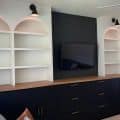We’ve seen IKEA hacks touching so many aspects of everyday living. Now, thanks to the combined efforts of the Lien Foundation, Lekker Architects and Lanzavecchia + Wai Studio, we see the power of hacking used to create a dementia-friendly home environment.
HACK CARE is a catalogue of more than 240 pages of tips and tricks to guide caregivers in creating a friendlier, safer home environment and enhance the lives of those with dementia.

The catalog is styled in typical IKEA fashion, down to the use of the line-drawn assembly man (and woman). At first glance, you might mistake it for an IKEA catalog.
Accompanying the catalog, you can also download the instruction manuals. The manuals feature the 4 main hacks which form the core of the catalog. From there, the catalog spins off over 50 DIY projects.
Super POÄNG
First up, we see a hacked POÄNG. The beloved armchair now sits at a more upright position. It has modified handles (using FROSTA legs) and supports which make it easier for elderly users to sit down and stand up independently. Yet, it still retains the classic form and curves of the POÄNG. Nice!
And they even added a very thoughtful napping surface to rest your head against. I’ll want to pad the APTITLIG chopping board though.

Great idea for making use of every inch of the POÄNG.

ALGOT alcove
Next is what’s called an ALGOT universe. It’s a series of shelving built around the chair to offer the privacy of an alcove while keeping the things they need within easy reach.

Fidget board
The third one, which I personally find really interesting is the Fidget Board. This chapter in the catalog is extensive, exploring many ways of fidgeting as a productive, therapeutic activity.
You can easily DIY a fidget board from a variety of IKEA chopping board and shelves, customising to the recipient’s needs.

Mobile living table
The last one is a Living Table. It takes a regular IKEA table and adds various accessories to boost its versatility. It can then be adapted to various scenarios and setups, such as for mealtimes, craft and activities.

In a press release, Mr. Lee Poh Wah, CEO of the Lien Foundation said, “Living with dementia is daunting, and our everyday home environments do not always anticipate or meet the unique needs of people battling cognitive and physical frailty. These challenges can be mitigated with good design that is functional, inspirational and accessible, and shaped by the shared experiences of caregivers who have been on a similar journey,”
For this project, the Lien foundation and design studios chose to work with IKEA products due to its accessibility and ease of use. Nevertheless, the Hack Care book is not affiliated with IKEA.
Head over to Hack Care to download the book and instruction manuals. Besides the hacks, there are also inspiring stories and essays on living with people with dementia. You’ll be inspired to see things differently.
